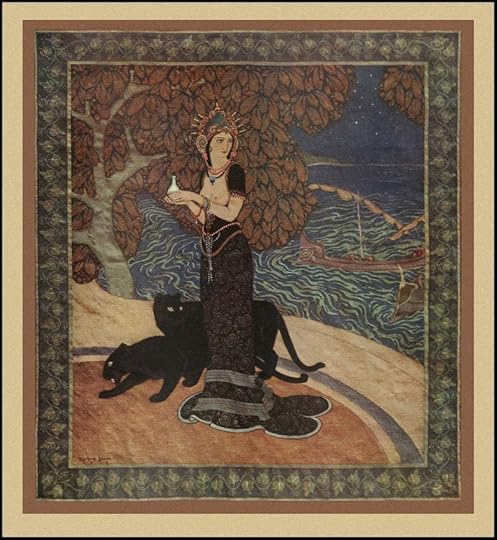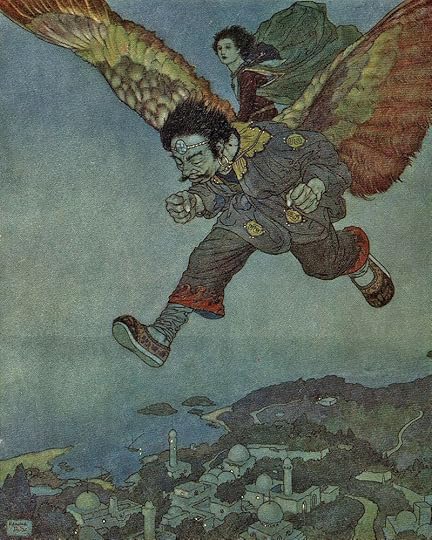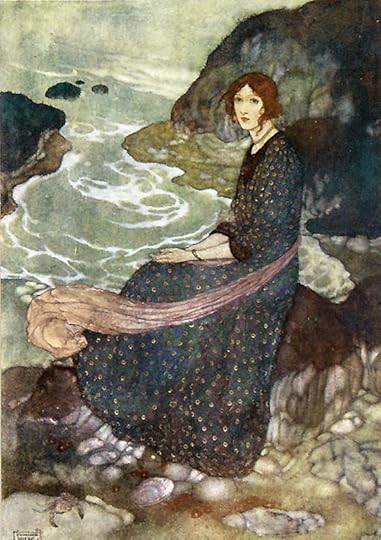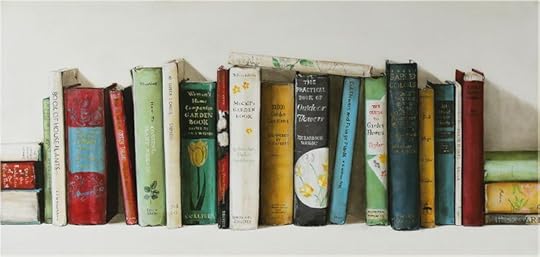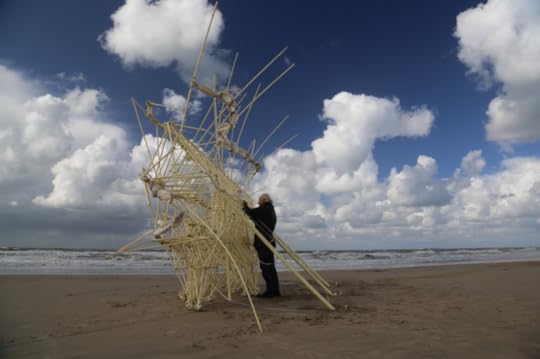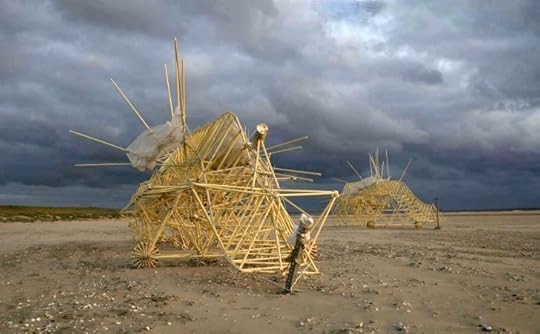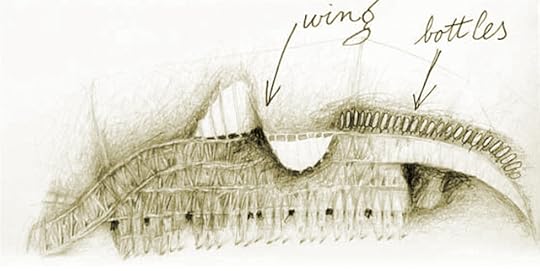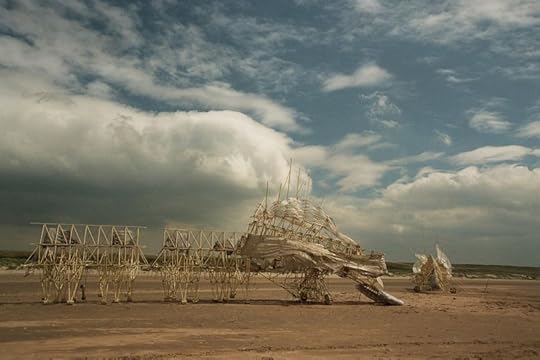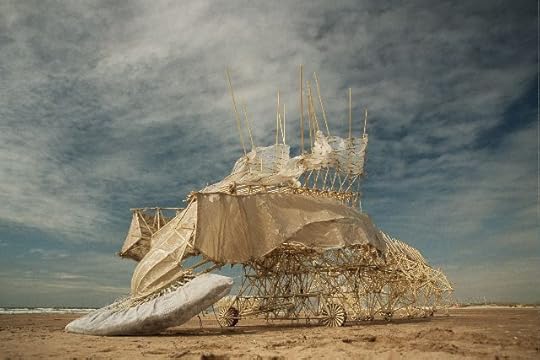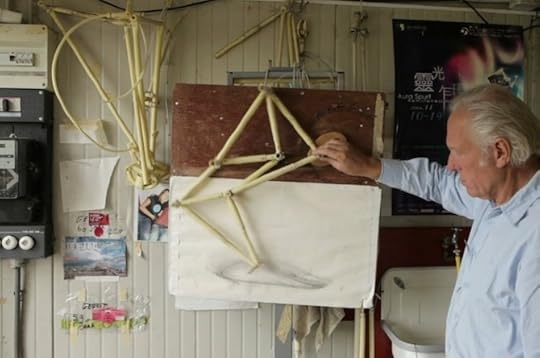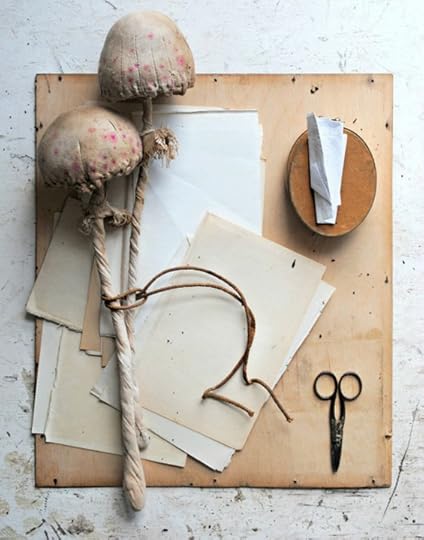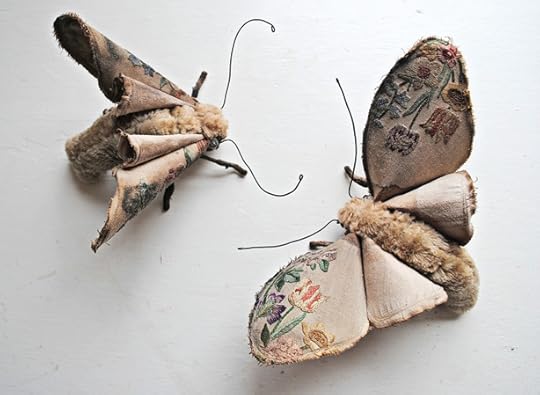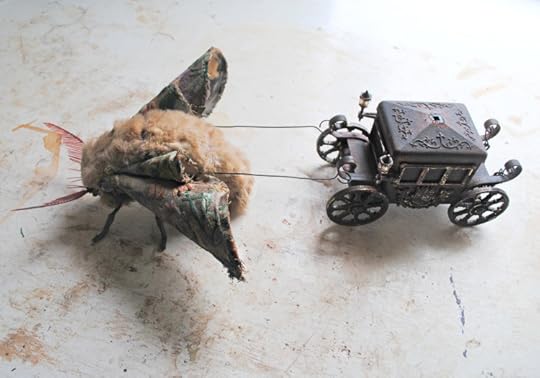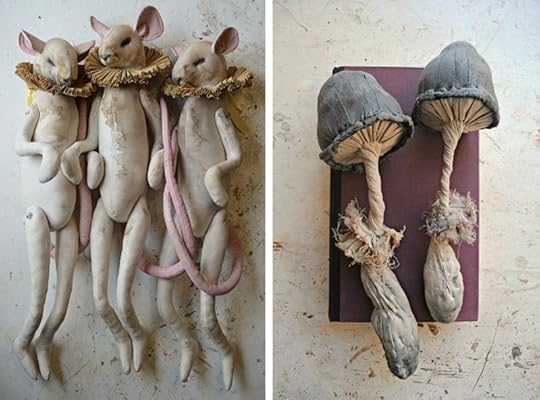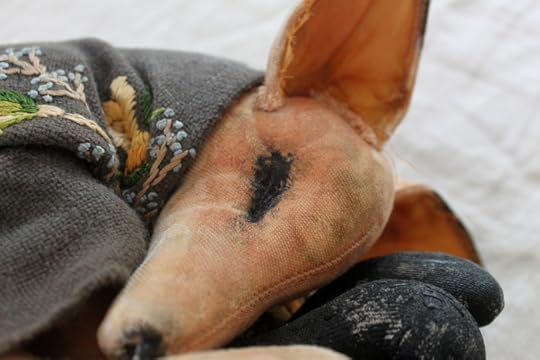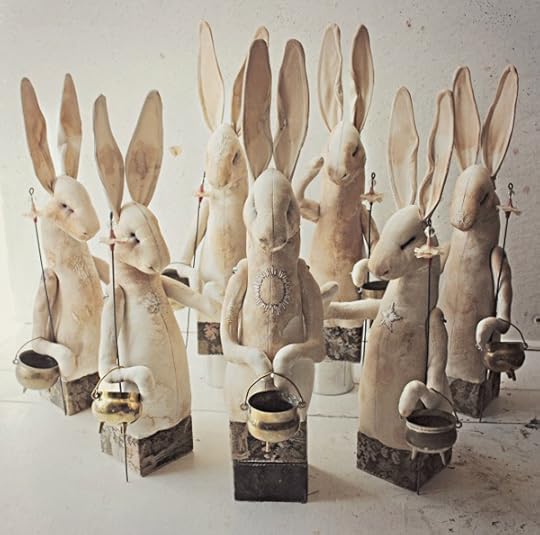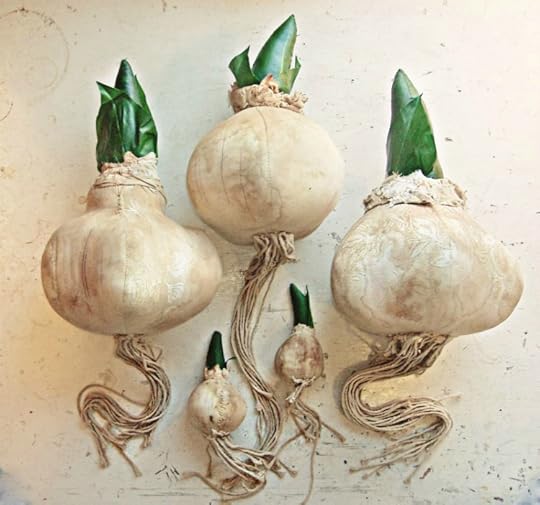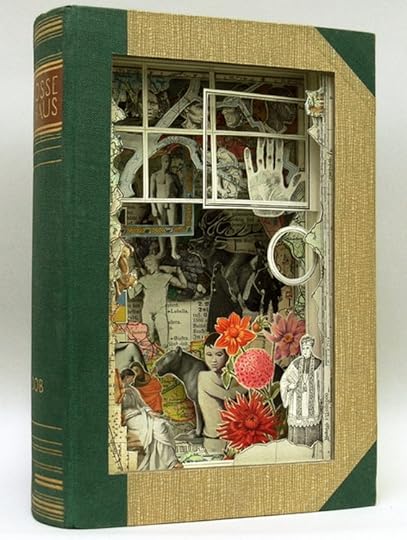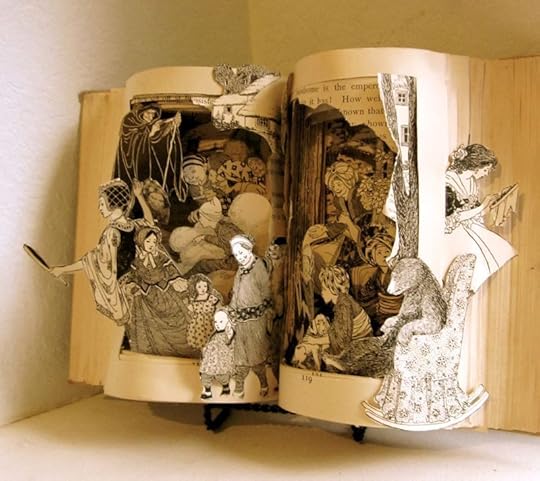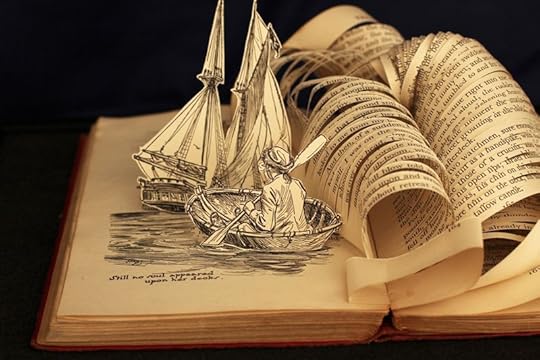Terri Windling's Blog, page 158
August 25, 2014
Tunes for a Monday Morning
Howard and I discovered the beautiful music of the Crow Puppets last month, when they shared a stage with Howard's band, the Nosey Crows, at a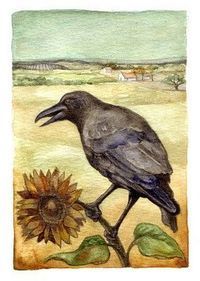 music festival in north Devon. (There seems to have been a bit of a crow theme that day.) Crow Puppets consists of singer/songwriters Cara Roxanne and Em Marshall, who "first met when they moved into a haunted house by a crumbling castle fringing Dartmoor." Their "homespun folk music" has a mythic and magical bent, and I recommend their new album, Whispering Hills, Tangled Hair. The Crow Puppets are based in Ashburton, Devon, which is just across the moor from Chagford.
music festival in north Devon. (There seems to have been a bit of a crow theme that day.) Crow Puppets consists of singer/songwriters Cara Roxanne and Em Marshall, who "first met when they moved into a haunted house by a crumbling castle fringing Dartmoor." Their "homespun folk music" has a mythic and magical bent, and I recommend their new album, Whispering Hills, Tangled Hair. The Crow Puppets are based in Ashburton, Devon, which is just across the moor from Chagford.
Above, Cara Roxanne's animation for their song "Red Ribbons" - a rather cold and wintry song for a mild summer day, but nevermind. Below, The Crow Puppets perform "Whispering Hills" at last year's Accoustica Festival in Exeter. The artwork on the left is "Summer Crow" by Rima Staines.
The Crow Puppets' music reminds me a little of another wonderful West Country musician, Martha Tilston, who is based in Cornwall. Her most recent CDs are Lucy and the Wolves and Machines of Love and Grace, but all of her albums are lovely.
Above: Martha and her band perform "More" (a song whose sentiments I agree with wholeheartedly) for Folk Radio UK last autumn.
Below: Martha performs "The Golden Surfer" back in 2006. It's not particularly well filmed, but the song is terrific: an updating of an old English folk ballad to reflect surfer culture on the Cornish coast. (Previous Monday Tunes from Martha are here and here.)
And one last piece today:
The charming video by Martha's brother, Joe Tilston, for his song "Liza and Henry." It comes from Embers (2013) -- another recommended album, influenced both by Joe's punk rock past and his family roots in the English folk scene. (There's an interesting post on the album's art and design by Tim Rickaby here.)
August 22, 2014
Travelers' Tales
From "Travel Notes" by Lloyd Alexander:
"Most of us, on our journeys, go no-frills economy. But we get postcards from other travelers who have ventured before us: views of country churchyards, daffodils, Grecian urns, nightingales, birch trees. A windmill from Don Quixote. A specimen of unusual insect life, sent by Gregor Samsa. A raft on the Mississippi -- best wishes from Huck and Jim. Greetings from Paradise. From the Inferno. From the rabbit hole.
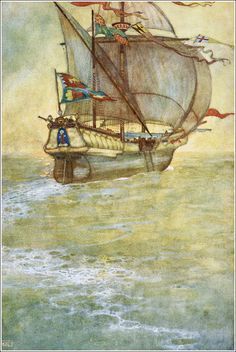 "The messages vary. Don't eat the lotuses. Exact change required on the ferry across the Styx. The best of times, the worst of times. All the world's a stage. All happy families are alike. Beware the Jabberwock. I am
"The messages vary. Don't eat the lotuses. Exact change required on the ferry across the Styx. The best of times, the worst of times. All the world's a stage. All happy families are alike. Beware the Jabberwock. I am
only escaped alone to tell thee.
"C.P. Cavafy writes to us:
As you set out for Ithaka
hope your road is a long one,
full of adventure, full of discovery.
Laistrygonians, Cyclops,
angry Poseidon -- don’t be afraid of them
"To which adds Lemuel Gulliver: 'A traveler's chief aim should be to make men wise and better, and to improve their minds by the bad as well as the good example of what they deliver concerning foreign places.'
"A commendable purpose. Travelers' tales, though, are notorious for enchancing the facts. They rank with fish stories and autobiographies, a few notches above political speeches. Mark Twain, that most reliable of pilots, who spoke as much truth as any of us have courage to bear, claimed superiority over George Washington. 'He couldn't tell a lie,' says Mark Twain. 'I can.'
"We are entitled to ask if any of these tales have credibility. They are not laboratory reports of discoveries of science, awesome and enlightening as those may be. The are not official communiques, which seldom have more than a nodding acquaintance with veracity. They are not history, an altogether different order of fantasy. The messages of literature come from flesh-and-blood creatures like ourselves. They have been there ahead of us. They know the territory.
"I believe their messages are the most accurate we will ever get. They are true. As a fairy tale is true. As mythology is true. 'Myths are among the subtlest and most direct languages of experience,' writes George Steiner. 'They re-enact moments of signal truth or crisis in the human condition.' And from Elizabeth Cook: 'The inherent greatness of myth and fairy tale is a poetic greatness...extended lyrical images of unchanging human predicaments and strong, unchanging hopes and fears, loves and hatreds.'
"My purpose, however, is not to explore the great cosmologies, but the small ones; and to suggest that art is a process whereby life becomes myth, and myth becomes life....For us, the journey is a central fact of our lives. Having set out on it, like it or not we have to keep on -- to be heroic in spite of ourselves. Sometimes our most courageous act is to get up in the morning.
"Cavafy tells us:
Hope your road is a long one.
May there be many summer mornings when,
with what pleasure, what joy,
you enter harbors you’re seeing for the first time;
may you stop at Phoenician trading stations
to buy fine things,
mother of pearl and coral, amber and ebony
Marvelous souvenirs. But we can't keep them. They become valuable only when given away. This is not to say that we have gained nothing.
Ithaka gave you the marvelous journey.
Without her you wouldn't have set out.
"I hope the postcards we send back are of some use to those who have only started on their own journey; if not useful, at least pleasurable. Earlier, I asked if we should trust those messages. I should have asked, Can we trust art? We not only can, but I think we must."
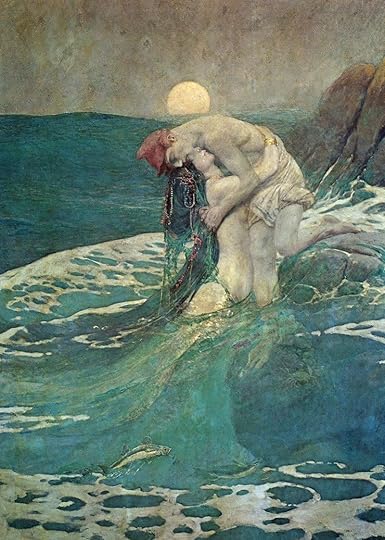 Art above: "Circe the Enchantress," "Treasure Island," "Aladdin," and "The Abyss of Time" by Edmund Dulac (1882-1953); "Dorelia Reading" by Augustus John (1878-1961); "Off Black Spruce Ledge" by N.C. Wyeth (1882-1945); and "The Mermaid" by Howard Pyle (1853-1911).
Art above: "Circe the Enchantress," "Treasure Island," "Aladdin," and "The Abyss of Time" by Edmund Dulac (1882-1953); "Dorelia Reading" by Augustus John (1878-1961); "Off Black Spruce Ledge" by N.C. Wyeth (1882-1945); and "The Mermaid" by Howard Pyle (1853-1911).
August 21, 2014
There and back again
I'm back in Devon again, but more tired out from my travels than I'd anticipated, so Myth & Moor will resume tomorrow. Tilly is pleased that Howard and I are home, and is celebrating with a new bone. She'd like to share her good fortune with all of you.
"Every traveler has a home of his own," said Charles Dickens, "and he learns to appreciate it the more from his wandering." The first part of his quote isn't always true; but, for me, the second part most definitely is.
UPDATE: I seem to be fighting off some kind of bug, so I might be back tomorrow, or I might not be back online until Monday....
August 13, 2014
Recommended Reading
I'm heading into London to visit with publishing colleagues and won't be back in the office again until Wednesday, August 20. Here are a few good articles I've found, here and there, to peruse in the meantime....
Especially recommened:
* "Ghosts in the Sunlight," a gorgeous commencement speech by Hilton Als (The New York Review of Books).
* "How Not to Write Your First Novel," a cautionary tale from the wonderful Lev Grossman (BuzzFeed Books).
* "Stories are Waves" by Michelle Nijhuis, discussing Bilbo Baggins as a girl and re-imagining classic texts (Aeon Magazine).
* An interview with novelist, critic, and mythographer Marina Warner, discussing fairy tales, feminisim, and other things (Prospect).
* "Diary: In the Day of the Postman," an excellent essay on letters, email, and time by Rebecca Solnit (London Review of Books).
Plus four good articles related to the subject of Solnit's essay: Jacob Burak's "Escape from the Matrix" (Aeon Magazine), Mark Edmondson's Pay Attention! (The Hedgehog Review), Andrew Leonard's review of Dan Hoyle's one-man show,"Each and Every Thing" (Salon), and Maria Popova's lovely piece on "Staying Present and Grounded in the Age of Information Overland" (99U).
Other good reads:
* Cécile Eluard, the daughter of poet Paul Eluard, discusses growing up among the Surrealists (The Guardian).
* Olivia Laing, author of To the River, discusses writers and alcohol (The Guardian).
* "Chasing Orwell's Ghost" by Matthew Bremner, text and photographs from the remote Scottish island where George Orwell finished writing 1984 (Roads & Kingdoms).
* "Virginia Woolf's Idea of Privacy" by Joshua Rothman (The New Yorker).
* "Tove Jansson, Queen of the Moomins" by John Garth (The Daily Beast).
* "Adriaen Coenen's Fish Book, 1580" (The Public Domain Review, via Rima Staines).
* "If a Cat Could Talk" by David Wood (Aeon Magazine).
* "Top Ten Literary Rodents" by Kate DiCamillo (The Guardian).
* "Secrets of the Stacks" by Phyllis Rose, on how libraries decide which books to keep, and which to weed out (Medium).
The beautiful still life paintings here are by Toronto artist Holly Farell. Please visit her website to see more of her work.
August 12, 2014
Strandbeesten
I am awed and inspired by the work of Dutch artist Theo Jansen, who creates "sand beasts," kinetic sculptures that roam on the coast near his house in the Netherlands.
Jansen's sandbeesten remind me of this passage from Caspar Henderson's essay "Rereading The Book of Imaginary Beings by Jorge Luis Borges":
Such creatures, he writes, "remind us of what is beyond dream – the real forms of living creatures that exist without human agency....For we who live in the light of what paleontology, evolutionary biology and genetics are revealing about living forms, our response to the real may – will, if we are truly awake – be one of astonishment and wonder at life's inventiveness. Even ordinary-seeming animals are marvellous in the light of evolution: the chicken, for example, is the closest living relative of Tyrannosaurus rex. Extraordinary ones make those in the pages of a medieval bestiary seem poor indeed. Compared to the leafy sea dragon (a cousin of the seahorse that looks very much like seaweed and yet also like a dragon) and the sea slug Elysia chlorotica (which photosynthesises with genes stolen from the algae it eats, and is as green as a leaf), the mythical Barometz, or vegetable lamb of Tartary, is a dull affair.
"The contemplation of natural history allows us to marvel at our place in the universe. As Charles Darwin wrote early in his career, 'If, as the poets say, life is a dream, I am sure in a voyage these are the visions which serve best to pass away the long night.' "
(Casper Henderson is the author of The Book of Barely Imagined Beings: A 21st Century Bestiary.)
In the very short film below (by Georgi Banks-Davies & Lucy Campbell Jackson), Jansen discusses his "animals," and you can glimpse one of the smaller Standbeesten in motion.
(For a more in-depth look at the artist's creative process, listen to his 2007 TED talk here.)
The next film, "Strandbeest Evolution," from Jansen himself, shows numerous examples of the beasts as they've evolved since 1990, with the music of Khachaturian's Spartacus.
August 11, 2014
Secret threads
From a 1940 text* by C.S. Lewis:
"You may have noticed that the books you really love are bound together by a secret thread. You know very well what is the common quality that makes you love them, though you cannot put it into words: but most of your friends do not see it at all, and often wonder why, liking this, you should also like that.
"Again, you have stood before some landscape, which seems to embody what you have been looking for all your life; and then turned to the friend at your side who appears to be seeing what you saw -- but at the first words a gulf yawns between you, and you realise that this landscape means something totally different to him, that he is pursuing an alien vision and cares nothing for the ineffable suggestion by which you are transported.
"Even in your hobbies, has there not always been some secret attraction which the others are curiously ignorant of -- something, not to be identified with, but always on the verge of breaking through, the smell of cut wood in the workshop or the clap-clap of water against the boat's side? Are not all lifelong friendships born at the moment when at last you meet another human being who has some inkling (but faint and uncertain even in the best) of that something which you were born desiring, and which, beneath the flux of other desires and in all the momentary silences between the louder passions, night and day, year by year, from childhood to old age, you are looking for, watching for, listening for?
"You have never had it. All the things that have ever deeply possessed your soul have been but hints of it -- tantalising glimpses, promises never quite fulfilled, echoes that died away just as they caught your ear. But if it should really become manifest -- if there ever came an echo that did not die away but swelled into the sound itself -- you would know it. Beyond all possibility of doubt you would say, 'Here at last is the thing I was made for.' "
This, to me, is what fantasy literature (and mythic arts) does best: it tugs on those secret threads, evokes bright worlds half-glimpsed at the corner of our eyes...where the heart's desire lies just ahead, but always just ahead, beyond the next turn of the page.
The gorgeous soft sculpturers here are by a textile artist in Leeds, near the Yorkshire Dales, who goes by the fairy tale name of Mr. Finch. You'll find the name of each sculpture in the picture captions. (For those who don't already know: run your cursor over the pictures to find them.)
"My main inspirations come from nature," writes the artist. "Flowers, insects and birds really fascinate me with their amazing life cycles and extraordinary nests and behaviour. British folklore is also so beautifully rich in fabulous stories and warnings and never ceases to be at the heart of what I make. Shape shifting witches, moon gazing hares and a smartly dressed devil ready to invite you to stray from the path. Humanizing animals with shoes and clothes is something I’ve always done and I imagine them to come alive at night. Getting dressed and helping an elderly shoemaker or the tired housewife.
"Most of my pieces use recycled materials, not only as an ethical statement, but I believe they add more authenticity and charm. A story sewn in, woven in. Velvet curtains from an old hotel, a threadbare wedding dress and a vintage apron become birds and beasts, looking for new owners and adventures to have. Storytelling creatures for people who are also a little lost, found and forgotten…."
Visit Mr. Finch's website and to see more of his wondrous work. I love it deeply.
* The Lewis quote comes from his book The Problem of Pain, published in The Centenary Press' "Christian Challenge" series in 1940. I first read it for a class on Lewis way back in my university days (as a non-Christian, it's not a book I would have been likely to pick up myself), and though it is indeed quite theological, it contains interesting passages on a number of other subjects too. In class, we read it in conjunction with Lewis' Grief Observed, about the death of his wife, which was a fascinating pairing.
A rainy day at the studio...
...tucked up among William Morris pillows, snoring, dreaming of woodland walks to come.
"Let the rain kiss you. Let the rain beat upon your head with silver liquid drops. Let the rain sing you a lullaby."
- Langston Hughes (The Dream Keeper and Other Poems)
August 10, 2014
Tunes for a Monday Morning
The theme today is "folk songs set in London," both because we've had London friends visiting and because we're heading there ourselves later this week....
Above, Jon Boden and Bellowhead kick things off with a great version of "The Rigs of Londontown" (2008). I love Boden, who (along with his partner Fay Hield) has done so much to promote awareness of traditional music across the UK.
Below, the great English folksinger Martin Carthy teams up with his equally talented daughter, Eliza Carthy, to perform "The Bows of London," a variant of the ballad "Cruel Sister" (2007). Martin Carthy was raised in London, but now lives in North Yorkshire with his wife Norma Waterson (of The Watersons).
Above, "In London So Fair," a video by The Skelligs, a Celtic band from Split, Croatia (2004).
Below, Irish folk legend Christy Moore revisits "Sweet Thames River Flow Softly" -- a Ewan MacColl song he first recorded with Planxty during the Folk Revival of the 1970s. Here, he teams up with Sinead O'Connor for a beautiful rendition filmed in 2009. (The second guitarist here is, alas, unnamed.)
And to end with, something a little different: "The Ballad of George Collins" performed on a London balcony by Sam Lee and friends -- an example of the terrific Alt Folk music being created in London today.
(I recommend Lee's fabulously bizarre video for the song, which I posted a year or so ago.)
August 8, 2014
The power of words (part IV)
"I tumbled for words at once....There they were, seemingly lifeless, made only of black and white, but out of them, out of their own being, came love and terror and pity and pain and wonder and all the other vague abstractions that make our ephemeral lives dangerous, great, and bearable."
- Dylan Thomas (Notes on the Art of Poetry)
"Perhaps it is the language that chooses the writers it needs, making use of them so that each might express a tiny part of what it is." - José Saramago (Ricardo Reis)
"A word leaves a smoke trail behind it that curls into the past. Every word is surrounded by complex energies. There are meanings underneath a word as well as its obvious meaning. Think of a word as a pendulum instead of a fixed entity. A word can sweep by your ear and by its very sound suggest hidden meanings, preconscious. Listen to these words: blood, tranquil, democracy. You know what they mean but you have associations with those words that are cultural, as well as your own personal associations." - Rita Mae Brown (Starting From Scratch: A Different Kind of Writers' Manual)
"When I cannot see words curling like rings of smoke round me I am in darkness -- I am nothing." - Virginia Woolf (The Waves)
"When we are young, the words are scattered all around us. As they are assembled by experience, so also are we, sentence by sentence, until the story takes shape." - Louise Erdrich (The Plague of Doves)
"The words emerge from her body without her realizing it, as if she were being visited by the memory of a language long forsaken." - Marguerite Duras (Summer Rain)
"The struggle of literature is in fact a struggle to escape from the confines of language; it stretches out from the utmost limits of what can be said; what stirs literature is the call and attraction of what is not in the dictionary." - Italo Calvino (The Literature Machine: Essays)
"Words ought to be a little wild, for they are the assaults of thoughts on the unthinking." - John Maynard Keynes (The New Statesman and Nation, July 15, 1933)
"You should write because you love the shape of stories and sentences and the creation of different words on a page. Writing comes from reading, and reading is the finest teacher of how to write." - Annie Proulx (The Paris Review, Spring 2009)
"Words should be an intense pleasure, just as leather should be to a shoemaker. If there isn't that pleasure for a writer, maybe he ought to be a philosopher." - Evelyn Waugh (The New York Times, Nov. 19, 1950)
"We may feel bitterly how little our poems can do in the face of seemingly out of control technological power and seemingly limitless corporate greed, yet it has always been true that poetry can break isolation, show us to ourselves when we are outlawed or made invisible, remind us of beauty where no beauty seems possible, remind us kinship where all is represented as separation." - Adrienne Rich (The Best American Poetry 1996, Introduction)
"I would hurl words into this darkness and wait for an echo, and if an echo sounded, no matter how faintly, I would send other words to tell, to march, to fight, to create a sense of the hunger for life that gnaws in us all." - Richard Wright (Black Boy)
"The natural, proper, fitting shape of the novel might be that of a sack, a bag. A book holds words. Words hold things. They bear meanings. A novel is a medicine bundle, holding things in a particular, powerful relation to one another and to us." - Ursula K. Le Guin (Dancing at the Edge of the World: Thoughts on Words, Women, Places)
"I had lines inside me, a string of guiding lights. I had language. Fiction and poetry are doses, medicines. What they heal is the rupture reality makes on the imagination. I had been damaged, and a very important part of me had been destroyed - that was my reality, the facts of my life. But on the other side of the facts was who I could be, how I could feel. And as long as I had words for that, images for that, stories for that, then I wasn't lost." - Jeanette Winterson (Why Be Happy When You Could Be Normal?)
"As readers, as writers, as citizens...[we] have an obligation to use the language. To push ourselves: to find out what words mean and how to deploy them, to communicate clearly, to say what we mean. We must not to attempt to freeze language, or to pretend it is a dead thing that must be revered, but we should use it as a living thing, that flows, that borrows words, that allows meanings and pronunciations to change with time." - Neil Gaiman (The Guardian, Oct. 15, 2013)
"The true alchemists do not change lead into gold; they change the world into words." - William Gass (A Temple of Texts)
The book art, paper sculptures and paper collages above are by Alexander Korzer-Robinson, Steven McPherson, Donna Ruff, Ellen Bell, Ekaterina Panikanova, M.J. Goerke, Jodi Harvey-Brown, Louise Richardson, Thomas Wightman, Ashley Lamoureux, Valley Nomidou
, and Jody Alexander. Run your cursor over the pictures for individual titles and credits. The last collage is one of mine, and contains this poem by Delia Sherman.
August 7, 2014
The power of words (part III)
"Here's what I mean by the miracle of language. When you're falling into a good book, exactly as you might fall into a dream, a little conduit opens, a passageway between a reader's heart and a writer's, a connection that transcends the barriers of continents and generations and even death. And here's the magic. You're different. You can never go back to being exactly the same person you were before you disappeared into that book." - Anthony Doerr (All the Light We Cannot See)
"Reading is sometimes thought of as a form of escapism, and it’s a common turn of phrase to speak of getting lost in a book. But a book can also be where one finds oneself; and when a reader is grasped and held by a book, reading does not feel like an escape from life so much as it feels like an urgent, crucial dimension of life itself." - Rebecca Mead (My Life in Middlemarch)
"Literature is my Utopia. Here I am not disenfranchised. No barrier of the senses shuts me out from the sweet, gracious discourses of my book friends. They talk to me without embarrassment or awkwardness." - Helen Keller (The Story of My Life)
"I realize that people still read books now and some people actually love them, but in 1946 in the Village our feelings about books -- I’m talking about my friends and myself -- went beyond love. It was as if we didn’t know where we ended and books began. Books were our weather, our environment, our clothing. We didn’t simply read books; we became them. We took them into ourselves and made them into our histories. While it would be easy to say that we escaped into books, it might be truer to say that books escaped into us. Books were to us what drugs were to young men in the sixties.
"They showed us what was possible. We had been living with whatever was close at hand, whatever was given, and books took us great distances. We had known only domestic emotions and they showed us what happens to emotions when they are homeless. Books gave us balance -- the young are so unbalanced that anything can make them fall. Books steadied us; it was as if we carried a heavy bag of them in each hand and they kept us level. They gave us gravity."
- Anatole Broyard (Kafka Was the Rage: A Greenwich Village Memoir)
"Books, for me, are a home. Books don't make a home -- they are one, in the sense that just as you do with a door, you open a book, and you go inside. Inside there is a different kind of time and space. There is warmth there too -- a hearth. I sit down with a book and I am warm." - Jeanette Winterson (Why Be Happy When You Could Be Normal?)
"A book is more than a verbal structure or series of verbal structures; it is the dialogue it establishes with its reader and the intonation it imposes upon his voice and the changing and durable images it leaves in his memory. A book is not an isolated being: it is a relationship, an axis of innumerable relationships." - Jorge Luis Borges (Other Inquisitions)
"If literature truly possesses a mysterious power, I think perhaps it is precisely this: that one can read a book by a writer of a different time, a different country, a different race, a different language, and a different culture and there encounter a sensation that is one's very own." - Yu Hua (China in Ten Words)
"I need words and print... I need print like an addict. I could live without it, perhaps. But I hope I never have to try." - Margaret Drabble
"Books may not change our suffering, books may not protect us from evil, books may not tell us what is good or what is beautiful, and they will certainly not shield us from the common fate of the grave. But books grant us myriad possibilities: the possibility of change, the possibility of illumination." - Alberto Manguel (A History of Reading)

The book scuptures above are by Jodi Harvey-Brown, Susan Hoerth, Justin Rowe, Su Blackwell, Rachel Ashe, Cecilia Levy, and Louise Richardson. Run your cursor over the pictures for individual titles and credits.
Terri Windling's Blog
- Terri Windling's profile
- 708 followers


